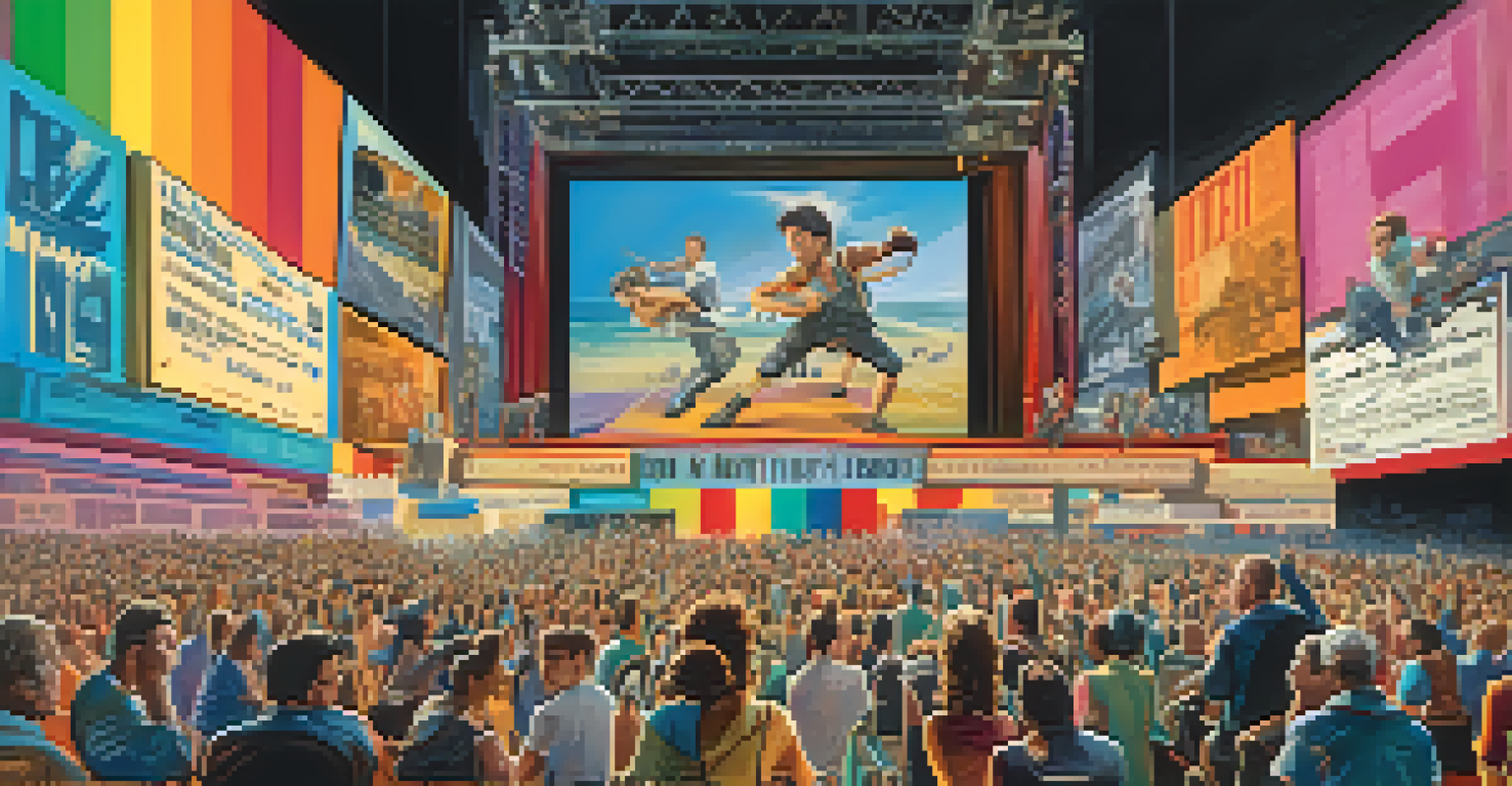The Role of Screenwriters in Shaping Hollywood's Film Landscape

Understanding the Screenwriter's Role in Film Production
Screenwriters are the architects of a film's narrative, crafting the blueprint that guides the entire production. Their work involves developing characters, dialogue, and plotlines that resonate with audiences. Without a compelling script, even the most talented actors and directors can struggle to create a successful film.
A screenwriter is a storyteller who gets to create the world and the characters that inhabit it.
Think of a screenwriter as the storyteller who sets the stage for everything that follows. They lay the groundwork for visual storytelling, guiding directors and cinematographers on how to bring their vision to life. This foundational work ensures that every scene contributes meaningfully to the overall story.
Ultimately, screenwriters play a pivotal role in shaping not just individual films, but also the broader trends and themes that define Hollywood at any given time. Their unique perspectives and creativity can influence genres, push boundaries, and even spark social change.
The Collaborative Nature of Screenwriting in Hollywood
Screenwriting is rarely a solo endeavor; it often involves collaboration with directors, producers, and sometimes even actors. This teamwork helps refine the script, incorporating different viewpoints and expertise for a richer final product. Such collaboration is essential in a fast-paced environment like Hollywood, where time and resources are limited.

Consider the classic example of a roundtable discussion, where different voices come together to brainstorm and improve the story. This process can lead to innovative ideas that might not have emerged in isolation. As a result, screenwriters must be adaptable, willing to incorporate feedback while remaining true to their original vision.
Screenwriters Shape Film Narratives
Screenwriters are essential in crafting compelling stories that guide the entire film production process.
Moreover, this collaborative spirit fosters a sense of community among creatives in the industry. By working together, they not only elevate their individual projects but also contribute to the collective evolution of storytelling in film.
Diversity of Voices: Changing Hollywood's Narrative Landscape
In recent years, the push for diversity in Hollywood has gained momentum, and screenwriters are at the forefront of this change. Diverse voices bring fresh perspectives and experiences that enrich the storytelling landscape. This shift allows for a broader range of narratives that reflect the complexities of modern society.
Diversity is not a set-aside program. It is a pathway to a new way of thinking, to new stories and new ways of telling them.
For example, films like 'Black Panther' and 'Crazy Rich Asians' broke box office records while offering representation that was previously lacking. These successes underscore the importance of diverse screenwriters who can authentically tell stories from their cultural experiences. This not only resonates with wider audiences but also challenges stereotypes and promotes understanding.
As Hollywood continues to evolve, the role of diverse screenwriters becomes increasingly vital. Their contributions can lead to transformative storytelling that not only entertains but also educates and inspires change.
The Importance of Originality in Screenwriting
Originality is the lifeblood of screenwriting, as it drives innovation and keeps audiences engaged. While adaptations of existing works can be successful, original scripts often stand out in a crowded market. A unique story can captivate viewers, making them feel part of something fresh and exciting.
Take, for instance, the phenomenal success of films like 'Inception' and 'Get Out,' which were born from original screenplays. These films showcased the power of original concepts and ideas, proving that audiences crave new narratives. Screenwriters who dare to think outside the box can redefine genres and create memorable cinematic experiences.
Collaboration Enhances Screenwriting
The collaborative nature of screenwriting enriches scripts through diverse perspectives and improves the overall storytelling experience.
However, achieving originality is not without its challenges. Screenwriters often grapple with the pressure of audience expectations and industry trends, making it essential to balance creativity with marketability.
The Influence of Technology on Screenwriting Practices
Technology has significantly transformed the screenwriting process, changing how scripts are written, shared, and produced. Software like Final Draft and Celtx has streamlined the formatting process, allowing writers to focus more on storytelling. This ease of use has made screenwriting more accessible to aspiring writers, democratizing the industry.
Moreover, the rise of online platforms enables screenwriters to share their work with a global audience, increasing opportunities for feedback and collaboration. The ability to connect with other creatives, producers, and even fans can lead to exciting new projects and partnerships. This interconnectedness enriches the storytelling process.
However, technology also brings challenges, such as the overwhelming amount of content available. Screenwriters must navigate this landscape carefully, ensuring their unique voice shines through in a sea of competition.
The Evolution of Genres Through Screenwriting
Screenwriters play a crucial role in shaping and evolving genres, pushing the boundaries of what is possible within cinematic storytelling. By experimenting with traditional tropes and structures, they can create new sub-genres or even redefine existing ones. This innovation keeps the film industry dynamic and exciting.
For example, the rise of the superhero genre has seen screenwriters incorporating elements from various genres, such as comedy, drama, and even horror. Films like 'Guardians of the Galaxy' blend humor with action, appealing to a diverse audience while expanding the genre's scope. Such creativity reflects the adaptability of screenwriters in responding to audience preferences.
Diversity Drives Hollywood's Evolution
The inclusion of diverse voices in screenwriting is crucial for creating authentic narratives that reflect modern society.
As genres continue to evolve, screenwriters must stay attuned to cultural shifts and audience expectations. Their ability to innovate within these frameworks not only shapes individual films but also influences the industry as a whole.
Navigating the Challenges of a Screenwriter's Career
While the role of a screenwriter can be rewarding, it is not without its challenges. The competitive nature of Hollywood means that breaking into the industry can be tough, often requiring persistence and resilience. Many writers face numerous rejections before landing a project, which can be discouraging.
Additionally, writers must adapt to an ever-changing industry landscape, as trends and audience preferences evolve. Keeping their skills sharp and staying informed about industry developments is essential for long-term success. Networking and building relationships can also play a critical role in securing opportunities.

Despite these challenges, the passion for storytelling often propels screenwriters forward. Their love for the craft and the desire to connect with audiences can outweigh the difficulties they face, driving them to create compelling narratives that resonate.